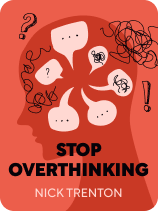

This article is an excerpt from the Shortform book guide to "Stop Overthinking" by Nick Trenton. Shortform has the world's best summaries and analyses of books you should be reading.
Like this article? Sign up for a free trial here.
Why should you listen to your emotions more? How does reflecting on your thoughts help you cope with stress?
Managing and understanding our emotions is one of the key things we learn as children—but even as adults we might need a refresher. We’re constantly experiencing stressful situations and sometimes we don’t know how to handle them.
Find out how listening to your emotions can help you manage stress.
How to Reflect on Your Thoughts and Feelings to Cope With Stress
In Stop Overthinking, Nick Trenton advises that after a stressful event, you can prepare yourself to better manage future stress by acknowledging and reflecting upon your stressful experiences. Ignoring your stress won’t make it go away. However, if you instead work through it constructively and listen to your emotions, you’ll gain more awareness about your emotions and what triggers your anxiety so that you can better approach similar situations in the future.
(Shortform note: In The Upside of Stress, Kelly McGonigal echoes the importance of acknowledging your stressful experiences, adding that you should be honest and realistic about your stress. Rather than force a positive outlook on every stressful situation, recognize your feelings but choose to focus on the positive side. One way you can do this is by considering how the situation might benefit you in the future.)
Trenton’s recommendations for reflecting on stress draw from the practice of cognitive behavioral therapy (CBT). This is a form of psychological treatment based on the theory that changing your thoughts can improve how you see the world and yourself. To reflect upon your thoughts and cope with stress, Trenton recommends you journal about your anxious thoughts and explore your feelings about it with curiosity.
(Shortform note: In Cognitive Behavior Therapy, Judith S. Beck elaborates that the main goal of CBT is to change your dysfunctional behavior (like overthinking, in this case) by changing your belief systems. The main question that CBT practitioners encourage patients to ask themselves is: “What was just going through my mind?” Asking this question allows patients to become more aware of their automatic thoughts and learn to recognize the negative biases behind them, which ultimately allows them to shift these beliefs into more positive ones.)
Journal About the Stressful Event
To manage stress, Trenton suggests you work through it by writing in a journal. When you ignore your anxious thoughts and feelings, you’ll struggle to understand what causes them. However, by writing them down in a journal, you can productively process your emotions, understand what triggers them, and glean insights on how you can better cope with stress in the future.
(Shortform note: In Why Zebras Don’t Get Ulcers, Robert Sapolsky provides additional reasons why you should understand triggers in order to manage future stressors. He explains that when you’re able to predict a stressful encounter, you’ll be better prepared to cope with it and less affected by it. At the same time, knowing when a stressful event will occur allows you to relax when you’re not expecting something stressful. Trenton’s advice of journaling your anxious thoughts helps you identify patterns to better predict and cope with future stress. Sapolsky provides similar strategies to make your life more predictable: make schedules, prepare budgets, and plan ahead for your activities.)
Trenton recommends a research-backed approach to journaling about your stress: Start by recounting the stressful situation and describing the thoughts and feelings you had in that moment. Consider using a rating scale for your stress levels and try to notice any patterns of what’s most frequently causing you stress. Then, shift your focus to extracting something positive from the situation.
For example, if you argued with your partner about who will drive the kids to school after a miscommunication, you might record feeling frustrated that your partner didn’t express their time conflict beforehand and rate your stress as 7/10. Then, try to transition your focus to something good, such as being grateful that neither of you raised your voice in front of the kids.
(Shortform note: This journaling approach that Trenton recommends is called positive affect journaling, which is a type of expressive writing that focuses on noticing the positive aspects of your life and past experiences. One study suggests that positive affect journaling can be more effective than simply recording distressing experiences. It found there are numerous health benefits that include a decrease in symptoms of depression and anxiety and an increase in resilience.)
Be Curious About the Stressful Event
Another way to process stressful events is to be open-minded and curious about your response to them. Instead of judging your thoughts and emotions, simply observe them. When you focus on being curious, you’re less likely to get caught up in feeling bad about yourself and how you reacted, which improves your ability to cope with stress.
To be curious rather than judgmental about your thoughts and emotions, Trenton argues you must first separate your personal identity from your problems—such as your tendency to overthink. Rather than trying to fix yourself, think about it as finding solutions to external problems that you’re just experiencing. When you distance yourself from your problems, you gain a sense of control and open yourself to new perspectives that can help you solve them.
Trenton suggests you use mantras and visualization to detach from your thoughts and emotions. A mantra is a statement you can repeat as a reminder to, for instance, distance yourself from your problems—“This problem doesn’t define me.” Visualization allows you to practice putting distance between yourself and your problems through your imagination. For example, imagine putting your stressful thoughts in a bottle and sending them out to sea.
You can even distance yourself from your anxious thoughts by personifying them or by seeing the humor in a situation. When you personify your thoughts, you give them a form outside of yourself, which allows you to analyze them with curiosity. One way Trenton suggests you do this is by imagining your anxious thoughts as a chatty friend trying to tell you a story. You can also personify your thoughts by giving them a silly name. For example, if you’re feeling guilty about a past mistake you made at work, give that moment a name like, “The Old Work Chronicle.”
Finding humor allows you to distance yourself by creating a new perspective on the situation that puts you in control. For example, if you’re embarrassed because a teacher called on you during class and you didn’t have the answer, picture what you must have looked like at that moment—perhaps like a character from your favorite cartoon caught in headlights.

———End of Preview———
Like what you just read? Read the rest of the world's best book summary and analysis of Nick Trenton's "Stop Overthinking" at Shortform.
Here's what you'll find in our full Stop Overthinking summary:
- What overthinking is and how it’s connected to stress and anxiety
- Ways you can manage stress before, during, and after it happens
- How to conquer your habit of overthinking with long-term solutions






